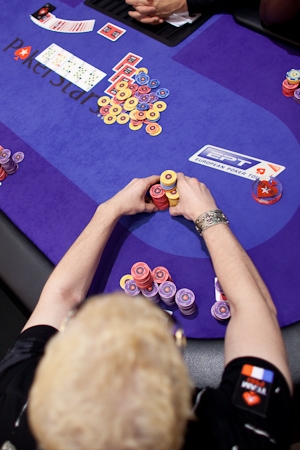|
|

Reraise - To raise after another player has raised previously.
When one of your opponents raises the pot in front of you, you are generally entitled raise the pot again, which is commonly referred
to as a “reraise.” When you choose to reraise, it forces all players who act after you to call both the initial raise as well as your
reraise amount, or else be forced to drop out of the hand. The reraise is a versatile play that can be used profitably in many
different poker situations.
Of all the reasons to reraise, the most obvious is to build the pot. Frequently, when you get the opportunity to reraise, it is
because one of your opponents had a strong enough hand to raise. This often means two or more powerful hands at once, for example a
full house against another full house. It can also be desirable to build the pot with a big draw, such as a nut flush draw with two
overs. It can be very profitable to jam it on a big draw, especially if you get multi-way action. You need not be a favorite to win
the hand, and frequently, you will not be. In fact, any time you are getting good odds on the money going into the pot, you should
consider if a raise would be profitable, regardless of whether or not you are an underdog. In other words, it can be profitable to
raise the pot with less than the best hand, as long as you get enough action from the worst hands.
Though it may sound counter intuitive, the reraise can sometimes result in smaller pots. This is because it is frequently used on the
flop and the turn as a ploy to thin the field,
isolate the raiser, and get heads up. In many
situations, it makes good sense to reraise as an isolation play. It can protect your hand from weaker draws by eliminating their pot
odds. It also makes sense to reraise if you suspect the bettor is betting a draw. Knowing that they are drawing is key. If they hit,
you shut down and don’t give them any chips. If they fail to hit, you can continue to bet with impunity knowing that they can’t call.
The fact that you can change your opponents’ pot odds by reraising is significant. In many situations it gives you the ability to
decide whether or not it is correct for your opponents to call. This acts as a lever of control. With a reraise, you can prevent
opponents from profiting from easy calls against you, and you can force them to pay the wrong price for their draws.
Reraising is also an excellent tool for tournament play, especially the later stages. Good tournament players are tough, well
disciplined and excellent risk managers. They often excel at making tough laydowns and extracting maximum profit in crucial
situations. At the end stages of a poker tournament, players will frequently attempt to steal blinds with hands which are not strong
enough for them to commit their entire stacks with if they are reraised. When a player steals with such a hand, a reraise will often
win the pot for you immediately, and if not, a continuation bet on the flop often prevails. It also flushes out your opponents’ really
big hands without over committing, by giving them an opportunity to come back at you before the flop if they hold a monster. In
tournament play, knowing the correct moment to reraise is crucial for success.
A player who raises and reraises frequently is known as an “action player.” If you tend to reraise too frequently, you may get labeled
a “speeder.” This label can both help you and hurt you. It can help you to get paid off, because your opponents will not give you much
credit when you bet. If they give you too little credit, they will be paying you off in many spots where they shouldn’t, which can be
good for you. On the other hand, if you are seen as a speeder, the tough and tight players will not give you any credit when you bet
and raise, and they will frequently punish you with a reraise when they have you beat or when they know that you cannot call.
Usage: Reraising The Turn, A Raise And A Re-raise
Previous Poker Term: Represent
Next Poker Term: Ring Game |
|









